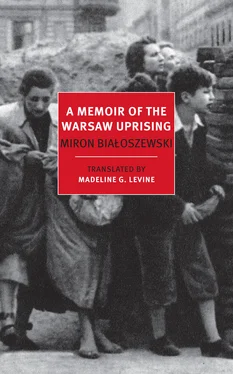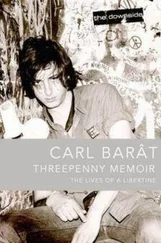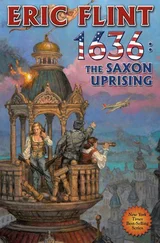Suddenly a woman orderly rushed into our shelter. “Who will help carry a wounded man?”
And suddenly, after the uproar and despite the explosions, there was silence.
“Will no one help?”
There were several hundred women there. And probably as many men. Everyone froze.
“No one at all?”
“I’ll go.” I stood up.
No one moved. I jumped up after the orderly. Up the stairs. And out into the street. Ogrodowa.
“Over here! Over here!” I snatched up the front end of a stretcher. And onward — fast. We joined a procession of stretchers. In front of us. Behind us. Toward Żelazna Street and farther on — in the direction of the courthouse, because that’s where the hospital for the uprising was located. The whole winding procession moved on toward the courthouse, toward the center of the city. It was Sunday afternoon, four or five o’clock, there was heat, rising smoke mixed with dust, either there was a fire nearby or something was just smoldering, explosions, cobblestones underfoot (we walked rapidly, now looking down at our feet, now forward again, now backward, now at the houses and the sky), scurrying, tall apartment houses, now and then barricades across the road, cornices. Also, I want to add, pigeons. But it seems either there weren’t any pigeons by then or they were kept so that they wouldn’t fly about; or perhaps they really were there and did fly up and wheel around and it was only the cornices and the window frames which had produced that smoke and dust. But the reason I don’t trust my memory about the pigeons (undoubtedly, I didn’t know then either what was what), because at other times and in other places I seemed to see the same thing, and right after the war, when I was living on Poznańska Street and it was Easter night with an early-morning Mass of the Resurrection, those pigeons — this time real ones — took flight and whirred among the cornices after every loud sound. So we were going at a trot. The shells were also pounding against the gates — traditional gates with a driveway leading into a courtyard, with wrought-iron Saint Nicholases on the sides or in niches. Against the barricades. The walls.
Before we reached Żelazna Street we had to squeeze through a narrow passageway (there were narrow passageways everywhere between the barricades and the walls as a security measure). After we crossed Żelazna, too. It seems two of them were near each other. Because the barricades were close together. Everywhere. And soldiers were lying down near Żelazna and firing their rifles. Ordinary ones. In the direction of Kercelak. There was panic. Civilians in flight. A desperate defense. News came of those burnings, firing squads, shootings, facts came, came right at us, ever nearer. Once, twice we ran past with those stretchers. The orderly and I were carrying a woman. Covered with ashes. On her hair. And her face. In convulsions. Her dress was shredded. She’d been buried. On Chłodna Street. Right behind us — although the person’s (a man’s) hands and legs were thickly bandaged, the blood was flowing so profusely that it was pouring off the stretcher. What else was there, farther along — I no longer know. The courthouse. We rush through the gate. People are standing there inside the gate, just some people, ordinary people, one of them our neighbor from 4 °Chłodna. She begins to cry at the sight of all this. I think a general convulsive sobbing began. Throughout the entire courtyard. They told me to set down the woman who had been buried. To leave her there. Because this is the hospital. I think they set down the stretchers. Ran to get the next ones. And these were already being carried inside.
I ran out in order to go home. On the way I dropped in — by the back way behind the sawmill — at 24 Chłodna, to Irena’s cellar. I found Irena there and those two owls, and Pan Malinowski, wearing an Antiaircraft Defense armband as a block leader. It was quiet here, more peaceful than anywhere else. At least in the second outbuilding. It didn’t face the front. Farther on, you could hear everything. And it was bad. But the peace in that cellar! Just an ordinary cellar. Twisting corridors, a maze of little rooms. Darkness. At most, a gray light fell inside there. It was nothing. I didn’t feel like going any farther. I told them. What I had seen. What was on the other side of Żelazna Street. Because they asked. I delayed like that. Delayed. Then it was evening. They advised me to wait. Here. For the night. Why make your way across Żelazna? Perhaps it’s even worse now than it was before, perhaps they’re already moving in? From here you can escape. It’s closer to Starówka. Almost everyone planned to go to Starówka as soon as they were ready. I talked more and more with those two owls on this theme. The elder, Heńka, her hair combed in an upsweep, was still worrying out loud about her children because they had remained in Praga at Wedel’s. The younger — Jadźka, I think — started telling our fortunes. I told them I had a friend on Rybaki Street. Swen. That actually he’d been living in Wola for the past few months, on Szlenkierów Street. That for some reason I think he’s on Rybaki now. Because his mother had remained there. Obviously, I had no proof. Intuition, at best. And what is called wishful thinking. That first Teik and Swen had broken off relations with each other over an insignificant matter, that I then broke off relations with Teik out of solidarity with Swen, and in the end I’d broken off relations with Swen and made up with Teik (let me remind you: Teik from Staszic Street) was something I paid no attention to in this situation. Another thing: I came up with the idea of swimming the Vistula. They grasped at that as an obvious plan. I said that Rybaki Street was just the same as Wybrzeże Gdańskie. Because of the apartment blocks. Also red. Poured concrete. Unfinished. Big. (Something of a “shelter for the homeless” during the war; Swen had lived there until recently although he’d been working for a long time as a social worker in the Parysów district.) So those apartment blocks faced Rybaki. The Vistula was behind them. All three of us could swim, we agreed. And from there we could steal out at night toward Żerań—Jabłonna. The Russians were already at Jabłonna. I don’t know how we imagined ourselves swimming to the other shore, which was also held by the Germans, and — even better — crossing the front. And such a front at that — a front as probably never had existed in the history of the world before this war. Probably we just assumed that since it was a question of Warsaw and Żerań everything would somehow take care of itself.
We stayed on there. Till night. The attack had ceased. There were the normal small explosions, noises. Maybe it was completely silent. Everyone came out into the yard. Discussions. Gossip. Newssheets. More tunneling. Of cellars, passageways. Pan Malinowski proposed that Irena and I should sleep in his apartment. After all, how can we go up to the fourth floor? And they have a large apartment on the ground floor, in the first courtyard. We go with him. I am given a room. My own. A bed. A quilt. I undress. I fold back the quilt in order to crawl under it, and then — what a noise from a shell hitting the corner of the house! Then a second, a third, a fourth; nothing, only shells. And flames. Everyone jumps up. Dashes into the courtyard. Waves of people pour into the courtyard from Ogrodowa Street. With suitcases, children, knapsacks. Some are leaving already. Others are gathering here. A crowd. Explosions. Discussions. Moving about from one group to another. Irena is standing there with a haversack. We consult. With Pan Malinowski. And the whole group. We are standing near the gate (wooden) onto Ogrodowa. But Irena is hesitant for some reason. And I think it’s high time. I consult the owls. They’re ready.
Читать дальше












